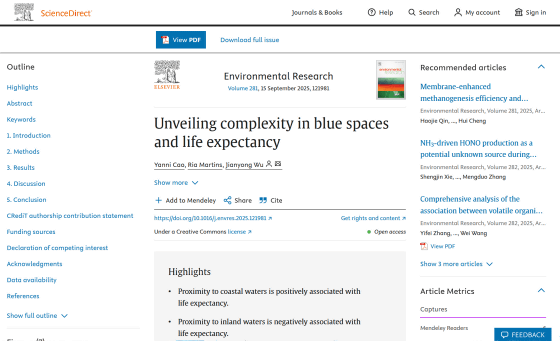Research shows that people who live in beach houses live longer

Living near water, such as the ocean or a lake, is known
Unveiling complexity in blue spaces and life expectancy - ScienceDirect
https://www.sciencedirect.com/science/article/pii/S0013935125012320

Could living near water mean you'll live longer?
https://news.osu.edu/could-living-near-water-mean-youll-live-longer/
People With a Home by The Ocean Live Longer And We Don't Know Why : ScienceAlert
https://www.sciencealert.com/people-with-a-home-by-the-ocean-live-longer-and-we-dont-know-why
Previous research has shown that living near water is associated with improved health indicators, such as higher physical activity levels, lower obesity rates, and improved heart health. A research team led by Assistant Professor Jang-Yong Wu , who studies environment and health at Ohio State University, wondered whether living near water might also be related to average life expectancy, and conducted a new study.
The study looked at 66,263 census tracts across the U.S. and examined the relationship between access to water and demographic data, including life expectancy. Life expectancy data was obtained from the Centers for Disease Control and Prevention (CDC), and detailed water access data was analyzed using a geospatial dataset created by the U.S. Geological Survey.
The average life expectancy across the 66,253 census tracts was 78.3 years, with considerable variation across tracts, ranging from 56.9 to 97.5 years. 49% of the population was male, 51% was female, and 14.9% was 65 years or older.

The analysis found that living near the coast (within 30 miles of an ocean or bay) was associated with a longer life expectancy, while living in an urban area near an inland lake or river tended to have a shorter life expectancy.
'Overall, coastal residents could expect to live a year or more longer than the average age of 79, and people living in urban areas near inland rivers or lakes were more likely to die by about age 78,' Wu said. People living in rural areas near inland rivers or lakes also had longer life expectancies, though not as long as those living in coastal areas.
Possible reasons for coastal residents' longer lifespans include lower temperature fluctuations, better air quality, and more recreational opportunities than inland urban areas. Differences in socioeconomic status may also play a role, as real estate prices tend to be higher along the coast than in other areas.
'On the other hand, pollution, poverty, lack of safe exercise opportunities, and increased flood risk (inland waterside areas) are likely the main causes of these differences,' said

'We suspected that any kind of waterfront space could have beneficial effects, but we were surprised to see such a significant and clear difference between coastal and inland residents,' Wu said. 'We found a clear difference: people live longer in coastal areas.'
Related Posts:
in Science, Posted by log1h_ik







